|
Dusty Dog Reviews The whole project is hip, anti-academic, the poetry of reluctant grown-ups, picking noses in church. An enjoyable romp! Though also serious. |
|
Nick DiSpoldo, Small Press Review (on Children, Churches and Daddies, April 1997) Children, Churches and Daddies is eclectic, alive and is as contemporary as tomorrow’s news. |



|
Kenneth DiMaggio (on cc&d, April 2011) CC&D continues to have an edge with intelligence. It seems like a lot of poetry and small press publications are getting more conservative or just playing it too academically safe. Once in awhile I come across a self-advertized journal on the edge, but the problem is that some of the work just tries to shock you for the hell of it, and only ends up embarrassing you the reader. CC&D has a nice balance; [the] publication takes risks, but can thankfully take them without the juvenile attempt to shock. |
|
from Mike Brennan 12/07/11 I think you are one of the leaders in the indie presses right now and congrats on your dark greatness. |
Volume 231, April 2012
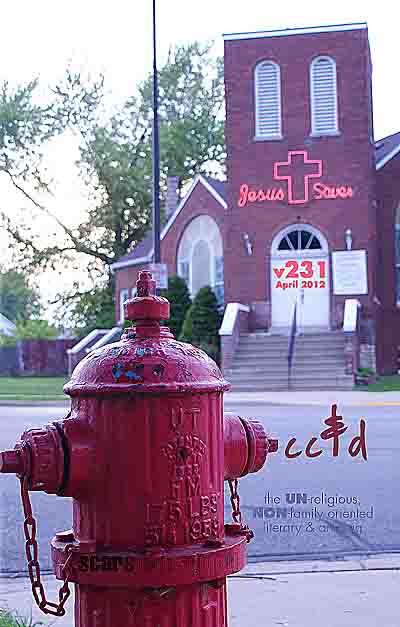
Internet ISSN 1555-1555, print ISSN 1068-5154
see what’s in this issue...
Note that in the print edition of cc&d magazine, all artwork within the pages of the book appear in black and white.
|
Order this issue from our printer as a a $7.67 paperback book (5.5" x 8.5") perfect-bound w/ b&w pages |

poetry
the passionate stuff
SheDan Fitzgerald
As we drift into sleep, |
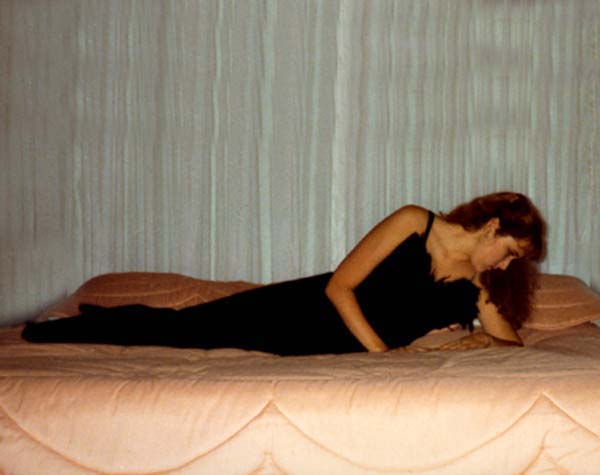
| John reading the Dan Fitzgerald cc&d 4/12 issues poem She |

Watch the YouTube video of John reading this poem at the Chicago open mike the Café Gallery (at Gallery Cabaret’ 4/11/12) |
The Seven Deadly Colors: Pucefrom the series “The Seven Deadly Colors”;a series of seven poems originally published in The Lamp-Post. Bob Johnston
My weekly column runs in fifty papers
My palate is a finely tuned instrument
When I enter a restaurant, the maître d渹
I partake sparingly of every course,
It is a good life, and I have no complaints.
Tonight it was a Mexican buffet.
On my way home, I was suddenly stricken
|
Bob Johnston BioBob Johnston is a retired petroleum engineer and translator of Russian scientific literature. He waited until his sixtieth year to start writing fiction and poetry, and over the next thirty years he has been trying to catch up. He lives in the original Las Vegas, New Mexico with his wife, three cats, and some hope of completing his memoirs and the Great American Novel.
|
“The Fountainhead” RememberedJoseph Hart
Dominique Francon took the vase
|
cc&dJoseph Hart
One half prays to Jesus
|
Burns & RussellJoseph Hart
How do you know animals
|
| John reading the Joseph Hart cc&d 4/12 issues poem Burns & Russel |

Watch the YouTube video of John reading this poem at the Chicago open mike the Café Gallery (at Gallery Cabaret’ 4/11/12) |
When A Republican SpeaksJoseph Hart
Whenever a republican
|
I look into the pool
Fritz Hamilton |
Stricken with sorrow over the murder of her sonFritz Hamilton
Stricken with sorrow over the murder of her son.
It’s happening like this everywhere,
Sons forever have been murdered,
It’s true, we’ve always been homicidal maniacs.
she’s delusional, it happens to everyone.
Doesn’t she realize humans are horrible?
we should chain her to the dungeon wall & rape her repeatedly
Maybe Karachi is too primitive for her to be aware.
what’s a more fashionable way to assert control ?
|
the GardenerMarcin Majkowski
I won’t go
I don’t want
I won’t serve
I chose for myself
http://depechmaniac.bloog.pl http://satyrykon.net http://ateist-kleranty.deviantart.com/
|
Poem from
Kenneth DiMaggio |
BurqaWayne Allen Jones
Within this cloth,
but I deny myself
They know they cannot fight or work
They mistake their lack of will
And they are dangerous.
Where is the woman judging them,
Here I am content
|
| ...from the Wayne Allen Jones Feature: the Wayne Allen Jones poem Burqa |

Watch this YouTube video of Wayne Allen Jones reading Burka live at the Café open mic in Chicago |
![]()
This Stuff Breaks Out on My Mind Like Pimples on a Teen-age ChinBruce Matteson
I once saw in the paper where a man was rejected from the police academy for being too smart
|
The Hoping, Killing CoalBrian Looney
Decadence,
Tobacco bliss,
An upright arm,
Sticks in the head,
|
Brian Looney BioBrian Looney was born 12/2/85 and is from Albuquerque, NM. He likes it when Lady Poetry kicks him in the head. The harder the better. Check out his website at Reclusewritings.com.
|
the Name of the GameR. N. Taber
It’s a so-secret game people play,
It’s a so-nasty game people play,
It’s a so-sad game people play
It’s a so-lonely game people play
It’s the blame game people play,
It’s a game we all love to deplore,
|
LecheryJackson Burgess
a long time ago I was told
my mind is a wrecking yard of
if a bluebird lands deftly on
the stream of your consciousness
|
ReleasedLuis Cuauhtemoc BerriozabalI want to be released from this life. I did not choose to be born. I can't cope with the duties I was assigned. There is no job I want to perform bad enough to earn a salary. There is no class I am willing to take to earn a degree. Every pill I have ever taken, every drug I ever tried, has not changed my mind one bit. Perhaps I was not meant to be born. I was born broken. Perhaps there is a lifetime warranty. Send me back for repairs or send me to the salvage yard. Sell my organs to someone that might have a use for them. I am not selfish. I want to give. But first I need to die.
|
When Christ Became our God of WarI.B. Rad
When America’s holy trinity was ordained
When Christ became our God of War,
|
All in the FamilyJames Livingston
Wintergreen
Then my young son
Then youthful adult
Now calmed down adult
|
He Lies in the TubJeffrey Park
He lies in the tub
|
Jeffrey Park BioBaltimore native Jeffrey Park currently lives in Munich, Germany, where he works at a private secondary school and teaches business English to adults. His latest poems appear or are forthcoming in Subliminal Interiors, Mobius, Punk Soul Poet, Darkling Magazine, The Camel Saloon and elsewhere.
|
So The WaterDavid Thompson
He’s sitting naked on the edge, watching
|
Aero Motor WindmillSheryl L. Nelms
sitting below
watching vapor trails
I wonder
it would
like
those slim prongs
to the top suspended between
to watch
world by
|
Genesis 27: Twenty-First Century EditionMichael Ceraolo
Jacob came to his aged father,
|
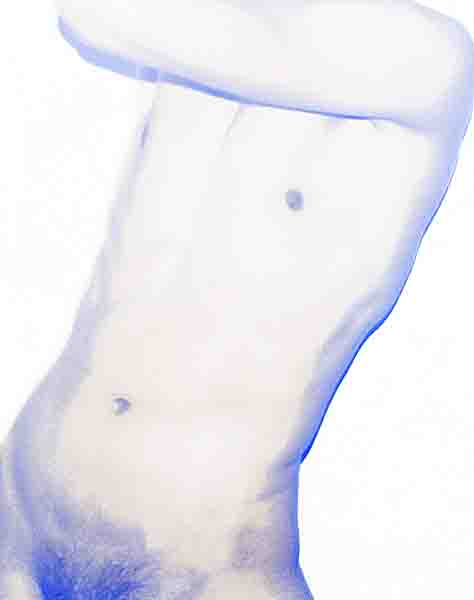
Ultrabright, art by Henry Walter Matthews
Start the RevolutionAudrey Burns
Three black haired sisters
They’re coming from New York
I stare at the sun in his
No, anger is an action
On the way back, I search for my black haired coven
While I am away
A smile that says I am happy
my throat aches
Months ago I strolled through the graveyard
|
Atlas Shrugged in 6 HaikuDon Hargraves
Hank Rearden:
Francisco d’Anconia:
Richard Halley:
James Taggart:
Dagny Taggart:
John Galt:
|
The Last Moon of WinterG.A. Saindon
We watch the orange egg of moon,
We stand on our front porch, dark and still;
Here, the last of my daughters to lift in my arms,
In me wells a quick sadness,
|
Hemingway Had It RightRobert D. Lyons
What people forget
|
Change of LifeDeni Ann Gereighty
It’s a proper cookie sheet
At 1 AM I am awake
Babies to be birthed
|
Eden’s MythAmanda Blair
if God created Eve
|
| John reading the Amanda Blair cc&d 4/12 issues poem Eden’s Myth |

Watch the YouTube video of John reading this poem at the Chicago open mike the Café Gallery (at Gallery Cabaret’ 4/11/12) |

Carnival, art by Oz Hardwick
UnconsciousJanet Kuypers07/11/11
I was unconscious
thirteen years ago
I internally laugh
thirteen...
right now
at my home
thinking of how
to breathe on my own
and it was almost thirteen days
and I’m still
|
 Listen
Listen Or watch the YouTube video |

See the YouTube video of Kuypers from the lip camera 07/12/11 at Chicago ’s the Café |
Conflicting ConvictionsJanet Kuypers07/11/11
I’ve seen the life you’ve led
I’ve seen you espouse one set of beliefs
but you need the security (whether or not you believe it)
and no
call me what you will
|
 Listen
Listen Or watch the YouTube video |

See the YouTube video of Kuypers from the lip camera 07/12/11 at Chicago ’s the Café |
keep looking for deathJanet Kuypers07/28/11 and 07/29/11
after knocking on death’s door
and now that i’m here so i keep looking for it
i walk down a sidewalk
i go to a store
 i was stopped at an intersection when two cars tossed me around like i was nothing and if the odds seem so slim that something like that could ever happen, i think of how i always seem to beat the odds and wonder how it may happen again:
 speeding down an expressway the wind may tunnel through as I am behind and next to a semi turning my car so i’m headed right into this big truck
i keep looking for it
|

See this YouTube video live at Waiting4the Bus at Café Ballou in Chicago 08/01/11 |

Watch this YouTube video read live 11/27/11, at the Café open mike she hosts in Chicago |

Beach at Sunset, image by Brian Hosey and Lauren Braden
you’ve left me on Siesta BeachJanet Kuypers07/29/11
got a hotel
it was all
but after
we argued
I couldn’t tell
but when I got back
I called your cell
at six I heard sirens
and saw the lights
my God, I thought
so I grabbed
I stepped inside
I heard
and he had no life vest,
out of the elevator
at the edge of the crowd
I glanced to my right
I ran toward that body bag
so he brought me over to the EMTs and said, I may know him
they looked at each other
I braced myself
he was bloated
from no blood curculating
where an actor
they even used to put coins
his eyes were wide open
“I don’t know this man,”
“people look different
and I said,
now I wonder
|

See this YouTube video live at Waiting4the Bus at Café Ballou in Chicago 08/01/11 |

See this YouTube video read 08/02/11, live at the Café in Chicago |
Janet Kuypers Bio
Janet Kuypers has a Communications degree in News/Editorial Journalism (starting in computer science engineering studies) from the UIUC. She had the equivalent of a minor in photography and specialized in creative writing. A portrait photographer for years in the early 1990s, she was also an acquaintance rape workshop facilitator, and she started her publishing career as an editor of two literary magazines. Later she was an art director, webmaster and photographer for a few magazines for a publishing company in Chicago, and this Journalism major was even the final featured poetry performer of 15 poets with a 10 minute feature at the 2006 Society of Professional Journalism Expo’s Chicago Poetry Showcase. This certified minister was even the officiant of a wedding in 2006. |

prose
the meat and potatoes stuff
The Little Black DressAnne Turner Taub
“Please, please, before I go, please let me have my little black dress.” said Josephine Wyatt as she lay dying in bed, three days before she would be gone forever.
|
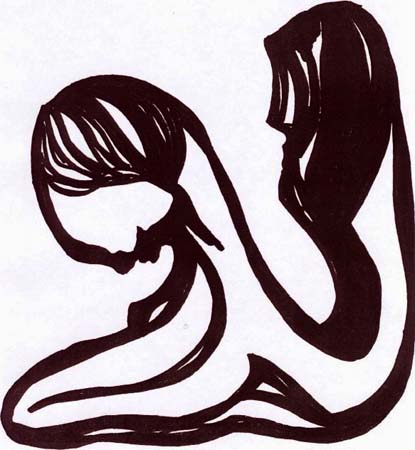
Regret, art by Edward Michael O’Durr Supranowicz
An Englishman’s House is his CastleDerrick Sherwin
He wasn’t a particularly good looking man nor ugly but basically ordinary in every respect. He didn’t get admiring glances and people didn’t discuss him except to remark how inoffensive he was. He was therefore surprised to find on holiday in Thailand, which he has heard was a friendly country, when girls appeared to notice him and even smile at him. His workmates made fun of him because he appeared to have little personality, no friends as such and certainly had not been known to have any girlfriends. They had told him that a Christmas holiday would put this right because the Thai girls fell for Western boys and called them Farangs – the polite Thai word for foreigner.
|

Dana, art by Brian Forrest
A Visit to the GrottoRonald Martin Wade
Max came in the back door, unannounced as usual, helped himself to a beer from the laundry room fridge and plunked down on my office couch. Max is a rather unusual friend in that he follows no religious or political convictions that customarily are found in the drawing rooms of more polite society. Max is a libertarian atheist. Introducing him to friends is sometimes embarrassing and inevitably awkward since I never know what route his conversation will take. Often he adapts to the conversational lead of someone else. Allow me to give you an example.
Lady: (In response to a question) I’ve been abroad for the past four weeks. We stayed with friends in Paris, saw the city, then drove down to the southwest of France and visited Lourdes, I wanted to see Bernadette’s grotto.
Max added a footnote to this parable. He notes that the 14-year old Bernadette saw her visions of the Blessed Virgin a dozen and a half times in 1858. But when she told her story, her parents and local priests were skeptical. However, when the Vatican got wind of it, things happened fast. By 1862, the Massabielle grotto cult was approved, fully chartered and in business.
|
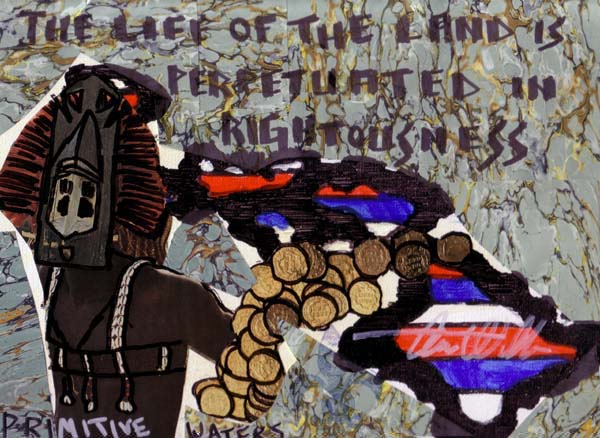
Primitive Waters, art by Aaron Wilder
DadArthur Levine
He called his wife from work to tell her he was cutting out early so he could be there for the boy’s party and he put his coat on, started the truck and came home.
|
My Aunt YolaBrandon A.M.
Aunt Yola let her white neglige slip to the floor.
|
The InterviewBob Strother
Benton Wellborn checked his watch, took one last look at his case notes, and sighed. Almost time for my one-thirty. He removed his glasses and pinched the bridge of his nose, then rose from behind his desk and walked to the window. The view was unexceptional—paved parking lot, fissured here and there by tree roots that had tunneled their way over from a narrow grassy area dotted with old live oaks and a few pecan trees. Beyond that a high, black wrought iron fence encircled the facility’s grounds and protected the good citizens of Savannah from a veritable hodgepodge of criminally deranged individuals. Nevertheless, and despite its undeniably institutional appearance, the view always had a calming effect on Wellborn.
Gordon opened the door, moved back allowing Danner to pass through, then closed it and thumbed the outside lock. Through the window he saw a frowning Wellborn bent over the rolling tray table he called his desk, scribbling furiously on the pages of blank note paper the facility supplied. Then he turned to Danner and raised his eyebrows. “How’d it go, Doctor? Y’all make any new breakthroughs today?”
|
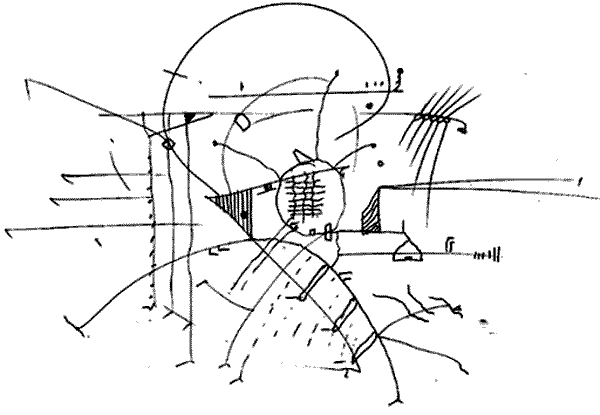
farmhead, art by the HA!man of South Africa
All About Ronny(ie)Roy Haymond
Live and let live, sure. Even all those years ago when we used different words to say what was what. I was in a live-and-let-live mode, thinking I was ever so broadminded. That was before I was faced with a real live test. And my reality streak showed itself.
“You said you were meeting an old friend here? You said his name was Ronny? What the hell is going on, Ken?”
|
about Roy Haymond
Born in Natchez, Mississippi, he moved to South Carolina as a teen. Lived with a sharecropper family before attending high school in the Charleston area, where he played clarinet in the Charleston Symphony Orchestra. After a hitch in USMC, he attended the University of South Carolina. After graduation, he taught in several disciplines in public schools in the Carolinas. Always supplementing the family income by playing tenor sax in commercial combos, he also did graveyard shifts in convenience stores, sold cemetery lots and cut grass. (“Mourning Castaway” published in Down in the Dirt", 2010; “Backup Man, Pueblo” in CC&#amp;D, 2011)
|
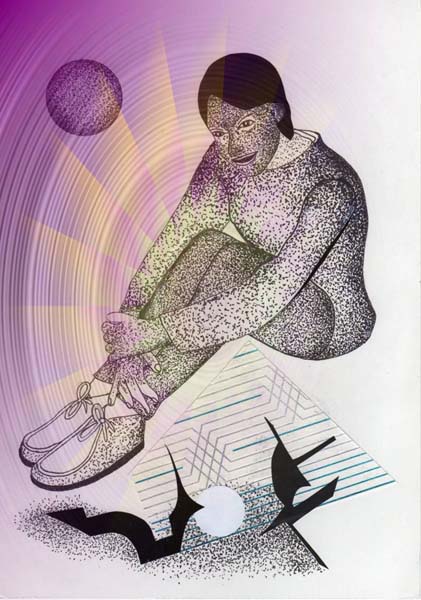
UZEYIR CAYCI 16.10.2010 GZGK, art by Üzeyir Lokman ÇAYCI
LuckJill E. HarrisAlison Murray opened a new Word document and put the date, “May 14, 2011,” at the top before she dialed Mrs. Chamberlain‘s number, set the phone beside her computer, and pushed the speaker phone button. Her elderly patron picked up, exchanged pleasantries, and began her dictation while Alison typed the memoir she would later edit, have bound, and deliver to Mrs. Chamberlain to distribute as gifts to her family.
Alison typed only slightly slower than Mrs. Chamberlain spoke. “Yes,” she said, “Go on.”
Alison felt that Mrs. Chamberlain was purposely portraying herself as similar to Alison in an effort to be reassuring. Nonetheless, it was effective, for Alison did indeed feel like the young woman whom Mrs. Chamberlain described herself as in her youth, and she was indeed encouraged by the comparison. The future might be brighter than the past after all, even if it turned out that there was no secret to luck to be gleaned from these stories, but only chaos, scientism, and an existentially random dispersal of luck and no luck.
|
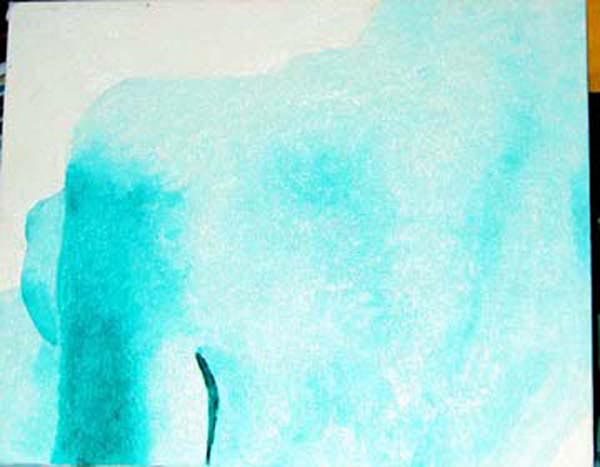
Green Shoulder, art by Cheryl Townsend
WorldKelly K. Darrow
I try hard, so very hard in this existence. It is not that easy, fact of business is it’s a struggle sometimes. Society is just absolutely raping our well being and scrapping us down to piddley little dry bones. The hardness of this world will scratch the skin from our bones leaving us blowing in the wind like a brown tube of snakeskin. Killing in the streets, killing in the movies, politicians killing our sense of trust towards anything. Families treating each other like cancer does an organ leaving us without family, which should be the basic bond.
|

Crevice, art by Peter LaBerge
Obvious But IgnoredJohn Duncklee
It is obvious that our system of government has been shattered. Greed employing money has been used to buy politicians, and it matters not which “side of the aisle” is considered; both sides are guilty.
|
John Duncklee BioJohn Duncklee has been a cowboy, rancher, quarter horse breeder, university professor and award winning author of 23 books and myriad articles, poetry and short stories. He is a Western Writers of America Spur award winner for poetry. He lives in Las Cruces, N.M. with his wife, Penny, an accomplished watercolorist.
|
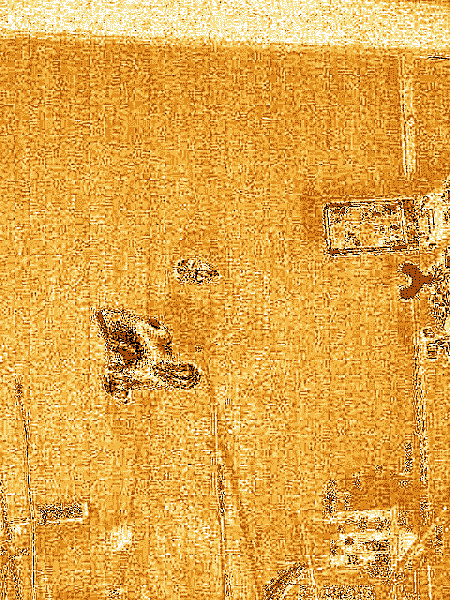
Loving Papers (Thanks to @ Lulu Lightning), photography by LuLu, and editing by Xanadu
O is for OddballBillie Louise Jones
Velvet Goslee was named after her mother’s favorite movie, starring Elizabeth Taylor. Velvet had golden hair that twined into Southern belle curls, enormous blue-violet eyes, and more dimples than Shirley temple. After her mama died when the thoroughbred threw her and stepped on her, Velvet had two grandmothers and five aunts who competed to take care of her and make her dresses, bows, and silk flower barrettes. In the evening, her daddy set her on his lap and read to her, his finger moving under the lines so that she quickly associated the print with the sound. Velvet had dolls and teddy bears, a Scottie dog, a sunny room with dotted swiss curtains, a little radio and picture books, a tea set and a play stove. The one thing her daddy would never do for her was give her a pony. Velvet was a precious angel who was adored by everyone who saw her.
Olivia Perkins was a little girl who learned to be quiet almost before she learned to talk. She had straight black hair and bangs down to her glasses, wide cheeks, and a small chin and mouth. The big, round glasses gave her a little owl face. She never remembered how she first learned to be watchful, so that she would know when to run and hide under her bed. Daddy might come in whistling, call out cheerfully for his girls, hug Mama, and feed Olivia jelly beans. Or Daddy might come in with his mouth and eyes narrowed to slits, clench and unclench his fists, and snap off his words like he was biting them; and everything Mama and Olivia did would be wrong. Olivia learned when it was time for Daddy to come in by watching Mama put the pots on the stove and look out the window. There was a pain in her stomach until Daddy opened the door and she could see on his face how it would be that night. There were nights when Daddy came in much later than usual, when Olivia was already in bed. Olivia heard Daddy beat his fists on the table or the wall; she might hear Mama cry out. She got so scared she hid under the bed. There was the night Mama locked Daddy out of the house. Olivia heard him roaring around the house knocking on windows. She heard shouts from neighbors. She heard a sound she later learned was a siren. Then it was quiet. Mama was crying when she came into Olivia’s room, pulled her out from under the bed, and got in bed with her. Olivia was too scared to ask what had happened.
Velvet and Olivia stood beside Bert Goslee and Connie Perkins when they got married. The girls looked as sweet as could be in pink dresses and silk flower wreaths. The party with the cake, frosted with sugar roses, a bridal couple on top, was so happy that no one noticed the girls did not say anything to each other. Velvet’s grandmothers fussed over who got to take Velvet and Olivia home first, while the newlyweds went on their honeymoon. Velvet expected that she would be folded into her grandparents’ arms. Olivia hardly believed they included her too.
Velvet and Olivia started the first grade. All over town, children walked to school. Velvet and Olivia set out together, carrying their notebooks, pencil boxes, and lunch sacks. A little boy saw them, waited by his gate, and went on with them. Children waited or caught up with each other, until groups of different ages converged on the schoolhouse, a red brick building with white stone trim on the corners. After school, the children moved off in groups, with children peeling off the group the way they had attached.
Children skated in the middle of quiet streets; they wore roller skates that fastened onto their shoes with keys. At one end of the block, Olivia skated out a story in her mind about an ice princess who skimmed over a frozen lake. She saw one of the big U boys walk into their family yard and pick the Scottie up by the skin on his back. The Scottie yelped. Everyone knew that big U boy was mean to animals. Terrified, but knowing she had to save the Scottie, Olivia skated onto the sidewalk and went after the big U boy. She beat her fists on his back. He swatted her away. She squatted down and threw handfuls of dirt and rocks at him.
Olivia kept her second report card pressed to her chest. A chunky older girl, who picked on littler girls, reached for the card. Olivia held tight to her card. The chunky girl pulled at her hand. “Oddball! Oddball!” Some other children were ready to start hooting. Olivia’s mouth shook and her eyes watered. She knew she was about to bawl, and that would only make it worse.
Still giggling over a game of let’s pretend – to be teachers! – the girls and the Scottie got on the sofa between Daddy Bert and Mama Connie. This was to be a family talk, and they knew they were supposed to be serious. Daddy Bert and Mama Connie looked very grown up. The girls tried to put on long faces.
Little Bert took his first walk outdoors with a big sister on each side of him. He hung onto a finger of each sister’s hand. They helped Little Bert down the three front steps. They watched Little Bert carefully when he negotiated the cracks between the cement squares. He looked straight ahead, where he was going, not down; he completely trusted the fingers he clung to, never a thought he couldn’t. Little Bert was wrapped in love, safety, happiness.
|

Debra Purdy Kong, writer, British Columbia, Canada I like the magazine a lot. I like the spacious lay-out and the different coloured pages and the variety of writer’s styles. Too many literary magazines read as if everyone graduated from the same course. We need to collect more voices like these and send them everywhere.
Children, Churches and Daddies. It speaks for itself. Write to Scars Publications to submit poetry, prose and artwork to Children, Churches and Daddies literary magazine, or to inquire about having your own chapbook, and maybe a few reviews like these.
what is veganism? A vegan (VEE-gun) is someone who does not consume any animal products. While vegetarians avoid flesh foods, vegans don’t consume dairy or egg products, as well as animal products in clothing and other sources. why veganism? This cruelty-free lifestyle provides many benefits, to animals, the environment and to ourselves. The meat and dairy industry abuses billions of animals. Animal agriculture takes an enormous toll on the land. Consumtion of animal products has been linked to heart disease, colon and breast cancer, osteoporosis, diabetes and a host of other conditions. so what is vegan action?
We can succeed in shifting agriculture away from factory farming, saving millions, or even billions of chickens, cows, pigs, sheep turkeys and other animals from cruelty. A vegan, cruelty-free lifestyle may be the most important step a person can take towards creatin a more just and compassionate society. Contact us for membership information, t-shirt sales or donations.
vegan action
Children, Churches and Daddies no longer distributes free contributor’s copies of issues. In order to receive issues of Children, Churches and Daddies, contact Janet Kuypers at the cc&d e-mail addres. Free electronic subscriptions are available via email. All you need to do is email ccandd@scars.tv... and ask to be added to the free cc+d electronic subscription mailing list. And you can still see issues every month at the Children, Churches and Daddies website, located at http://scars.tv
MIT Vegetarian Support Group (VSG)
functions: We also have a discussion group for all issues related to vegetarianism, which currently has about 150 members, many of whom are outside the Boston area. The group is focusing more toward outreach and evolving from what it has been in years past. We welcome new members, as well as the opportunity to inform people about the benefits of vegetarianism, to our health, the environment, animal welfare, and a variety of other issues.
Dusty Dog Reviews: These poems document a very complicated internal response to the feminine side of social existence. And as the book proceeds the poems become increasingly psychologically complex and, ultimately, fascinating and genuinely rewarding.
Dusty Dog Reviews: She opens with a poem of her own devising, which has that wintry atmosphere demonstrated in the movie version of Boris Pasternak’s Doctor Zhivago. The atmosphere of wintry white and cold, gloriously murderous cold, stark raging cold, numbing and brutalizing cold, appears almost as a character who announces to his audience, “Wisdom occurs only after a laboriously magnificent disappointment.” Alas, that our Dusty Dog for mat cannot do justice to Ms. Kuypers’ very personal layering of her poem across the page.
Fithian Press, Santa Barbara, CA Indeed, there’s a healthy balance here between wit and dark vision, romance and reality, just as there’s a good balance between words and graphics. The work shows brave self-exploration, and serves as a reminder of mortality and the fragile beauty of friendship.
Mark Blickley, writer You Have to be Published to be Appreciated. Do you want to be heard? Contact Children, Churches and Daddies about book or chapbook publishing. These reviews can be yours. Scars Publications, attention J. Kuypers. We’re only an e-mail away. Write to us.
The Center for Renewable Energy and Sustainable Technology The Solar Energy Research & Education Foundation (SEREF), a non-profit organization based in Washington, D.C., established on Earth Day 1993 the Center for Renewable Energy and Sustainable Technology (CREST) as its central project. CREST’s three principal projects are to provide: * on-site training and education workshops on the sustainable development interconnections of energy, economics and environment; * on-line distance learning/training resources on CREST’s SOLSTICE computer, available from 144 countries through email and the Internet; * on-disc training and educational resources through the use of interactive multimedia applications on CD-ROM computer discs - showcasing current achievements and future opportunities in sustainable energy development. The CREST staff also does “on the road” presentations, demonstrations, and workshops showcasing its activities and available resources. For More Information Please Contact: Deborah Anderson dja@crest.org or (202) 289-0061
Dorrance Publishing Co., Pittsburgh, PA want a review like this? contact scars about getting your own book published.
 The magazine Children Churches and Daddies is Copyright © 1993 through 2012 Scars Publications and Design. The rights of the individual pieces remain with the authors. No material may be reprinted without express permission from the author. 
Okay, nilla wafer. Listen up and listen good. How to save your life. Submit, or I’ll have to kill you.
Dorrance Publishing Co., Pittsburgh, PA: “Hope Chest in the Attic” captures the complexity of human nature and reveals startling yet profound discernments about the travesties that surge through the course of life. This collection of poetry, prose and artwork reflects sensitivity toward feminist issues concerning abuse, sexism and equality. It also probes the emotional torrent that people may experience as a reaction to the delicate topics of death, love and family. “Chain Smoking” depicts the emotional distress that afflicted a friend while he struggled to clarify his sexual ambiguity. Not only does this thought-provoking profile address the plight that homosexuals face in a homophobic society, it also characterizes the essence of friendship. “The room of the rape” is a passionate representation of the suffering rape victims experience. Vivid descriptions, rich symbolism, and candid expressions paint a shocking portrait of victory over the gripping fear that consumes the soul after a painful exploitation.
Dusty Dog Reviews (on Without You): She open with a poem of her own devising, which has that wintry atmosphere demonstrated in the movie version of Boris Pasternak’s Doctor Zhivago. The atmosphere of wintry white and cold, gloriously murderous cold, stark raging cold, numbing and brutalizing cold, appears almost as a character who announces to his audience, “Wisdom occurs only after a laboriously magnificent disappointment.” Alas, that our Dusty Dog for mat cannot do justice to Ms. Kuypers’ very personal layering of her poem across the page.
|